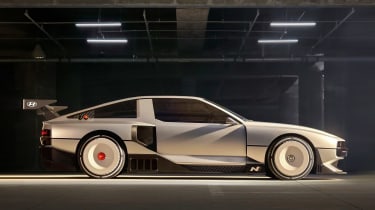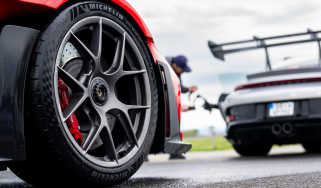‘I’ve sensed increasing resistance to the forced transition to electric cars’
Meaden glimpses an exciting alternative future to wall-to-wall EVs

These are strange and unsettling times in which to be a fan of fast cars. Change is all around us. Rarely a day goes by without a storied sports car marque ‘celebrating’ the last naturally aspirated V8, V10 or V12 screamer with some fabulous bitter-sweet final edition. Meanwhile, those mired in the midst of a depressing cycle of downsizing try desperately hard to convince us that we should be excited by a new four-pot hybrid. Sorry AMG, we love you dearly, but just because it’s called C63 and has eleventy billion horsepower doesn’t mean we’re going to lust after it in the way we did its biturbo V8 ancestor.
To be fair, trying to plan a long-term product development and comms strategy for an established automotive brand must be a nightmarish task. It’s certainly dividing the industry in ways not seen since the dawn of the automobile. Some manufacturers are clearly in for the long haul, doggedly clinging to internal combustion in the most exciting forms they can get away with. Meanwhile others – most notably Bentley, Bugatti, Jaguar and Lotus – have committed their futures to all-electric powertrains well ahead of time.
When it comes to those illustrious marques we’ve revered all our lives, the road to 2035 can seem like some kind of protracted death march. One that could see notable names fall by the wayside, others becoming so compromised as to be pale shadows of their former selves. Of course, this struggle to make sense of carbon emissions will also see some remarkable transformations, just as opportunistic new brands spring from the chaos.
So, who’s doing a good job? Hyundai’s at the top of my list. Not content with the recent transformation from purveyors of worthy but anonymous mainstream metal to excellent Nürburgring-honed ICE-powered hot hatches, we’re now being tantalised by the near-future RN22E concept, which is an explicit pointer to what we can expect from the Ioniq 5 N EV hot hatch.
Inevitably, of the established brands in evo’s orbit, you’d have to say Porsche is smashing it. Remaining true to such sporting DNA while simultaneously implementing a transition to hybrid and EV power is no easy task. The Taycan gave Porsche instant EV cred, but the upcoming EV-only Boxster and Cayman ranges will be the acid test. In the meantime it’s persisting with petrol, the hardest of hardcore ICE models – think GT4 RS and GT3 RS – being more scintillating than ever. As Porsche develops and promotes synthetic fuel as a viable means of future-proofing internal combustion (initially in motorsport) it’s safe to say we can expect piston power to remain in its portfolio for some time yet.
In recent months I’ve sensed increasing resistance to the forced transition to EV power. A recent Lamborghini launch dinner was spent putting the world to rights with some of the company’s senior management. The takeaway sentiment was that while the brand is developing EV tech because it would be crazy not to, rising interest and investment in synthetic fuel means the ICE is far from finished. Especially when combined with hybrid tech.

And then we have hydrogen. Talked about quietly for decades but always overshadowed by EV, support for it as a zero emissions alternative is growing. Toyota and Hyundai are the first to build and sell hydrogen fuel cell cars in meaningful numbers, but BMW is also pushing hard to develop hydrogen-powered cars and roll them out by 2030. Significantly, BMW is pushing just as hard to ensure policy-makers acknowledge it’s better to have a zero emissions solution that compliments EV than force everyone down the same route.
There’s also the unexpected influence of Formula 1. Rarely has it had any genuine relevance to road cars, but its increasingly global popularity and the recent interest shown by Audi and Porsche suggest that those brands with a vested interest – some might say dependence – on internal combustion see F1 as a lifeline. If you want to champion sustainable internal combustion technology there’s surely no better showcase.
> ‘Does Ferrari make the most reliable cars in the world? I think it might.’
F1 has already committed to powertrain regulations that will introduce a new breed of turbocharged hybrid engines running on synthetic gasoline from the start of the 2026. And from the start of 2031 it will adopt another set of powertrain regulations. Though this is still to be decided, it won’t be EV. Instead, hydrogen has been mooted as a serious contender.
What does it all mean? For now, it seems we’re in a weird state of limbo. One in which we’re still able to enjoy incredible petrol engines, but unsure what’s in store for fun, fast cars. While I have little faith in politicians and lobbyists, the automotive industry’s ability to invent and adapt is second to none. An EV-only future has never seemed viable or appealing, but one in which we have EV, hydrogen and synthetic gasoline? That feels way more exciting.
This story was first featured in evo issue 303.


